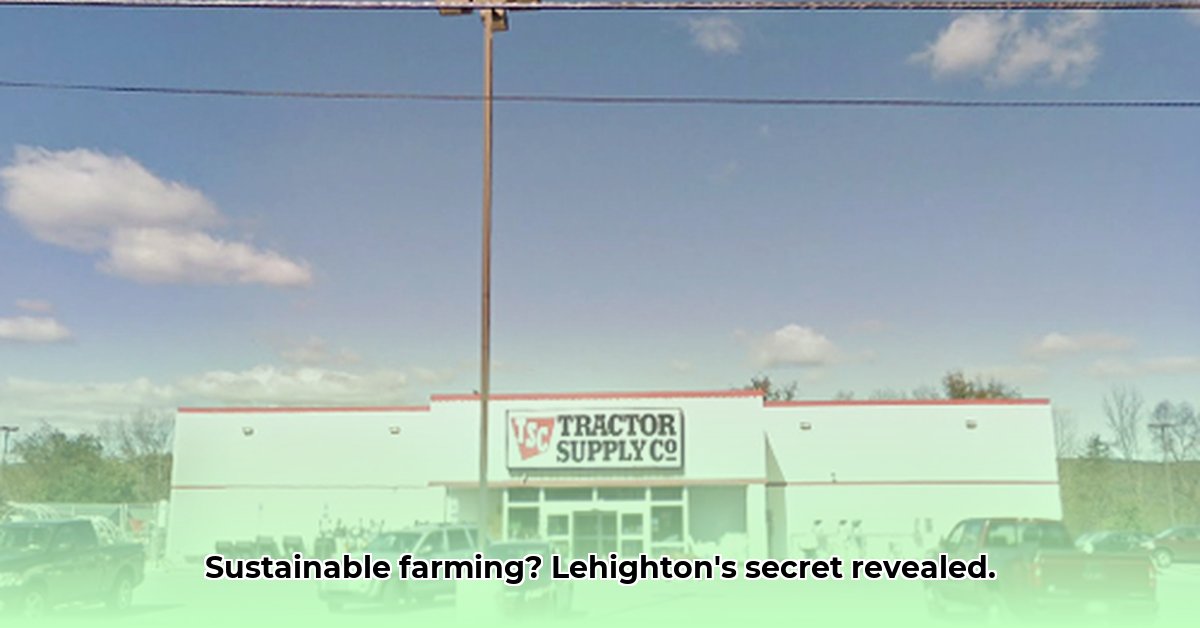
Lehighton Tractor Supply: A Deep Dive into Sustainable Farming
Lehighton, Pennsylvania's Tractor Supply Company (TSC) store occupies a prominent position within the local agricultural landscape. This investigation seeks to determine the extent of its contribution to sustainable farming practices in the area. While TSC offers products with potential sustainability benefits, a significant lack of readily available data presents a major challenge to a definitive assessment. Our analysis will highlight both the potential positive impact and the crucial gaps in information that hinder a conclusive evaluation.
Tractor Supply's Product Offerings and Their Potential for Sustainability
TSC's Lehighton store stocks a variety of products potentially beneficial to sustainable agriculture. These include seeds (though the proportion of organic varieties is unclear), fertilizers (the prevalence of organic or reduced-impact options requires further investigation), and water-efficient irrigation systems. The potential for positive environmental impact is undeniable; however, the actual extent of this impact remains unknown. Crucially, Tractor Supply does not publicly provide data on the sales or usage of these sustainable products. This lack of transparency significantly undermines the ability to assess their true contribution. How much of their overall sales volume consists of these eco-friendly options? This question remains unanswered.
The Data Deficit: A Critical Roadblock to Assessment
This investigation is significantly hampered by a substantial data deficit. Tractor Supply Company does not publish comprehensive sustainability reports or provide concrete figures on its environmental impact. This lack of transparency prevents a conclusive assessment of their role in promoting sustainable agriculture within the Lehighton community. It's impossible to determine, with any degree of certainty, if TSC’s offerings are significantly impacting local farming practices in a positive way. Without transparent data, any conclusions remain speculative. What percentage of their revenue is generated by ecologically conscious products? This lack of transparency forces us to rely solely on inference.
Inferential Analysis: Interpreting Limited Evidence
Based on observable evidence—the store's product catalog and its location within a farming community—we can draw inferences about TSC's potential contribution. The mere availability of potentially sustainable products suggests that local farmers have access to these resources. But this is not a definitive statement of impact. Are these products being actively purchased and utilized in sustainable farming practices? Data is crucial here, and its absence prevents us from confirming or refuting this assumption.
Stakeholder Analysis: Understanding the Perspectives and Roles
Multiple stakeholders play crucial roles in shaping the impact of TSC on sustainable agriculture in Lehighton. Understanding their diverse perspectives is vital for a complete assessment.
Lehighton Tractor Supply: Their product selection directly influences farmer choices. However, their lack of transparent reporting prevents a clear understanding of their commitment to sustainable agriculture. Are they actively promoting sustainable options? What investments are they making in sustainable supply chains? These questions need answers.
Local Farmers: Their adoption (or non-adoption) of sustainable products directly determines the actual environmental impact of TSC's offerings. What are their barriers to adopting sustainable practices? Cost? Awareness? Access?
Agricultural Researchers: They can provide vital data through studies assessing the real-world impact of TSC's products on farm sustainability. Have any studies yet measured the effectiveness of these products in the field?
Local Government & Extension Offices: Support from local government and outreach programs can play a significant role in promoting sustainable farming practices and ensuring farmers have the knowledge and support to leverage available resources.
Recommendations for Further Research: A Path to Greater Transparency
To move beyond inferences and arrive at conclusive findings, further research is imperative. This research should incorporate the following:
Quantitative Data Collection: Analyze sales data from the Lehighton TSC store to quantify the purchase volumes of sustainable products. This would provide concrete evidence of purchasing trends.
Qualitative Research: Conduct detailed interviews with local farmers to determine their use of TSC's products and their perception of the store's role in supporting sustainable practices.
Comparative Analysis: Compare TSC's sustainability practices and product offerings with those of other agricultural retailers in the region. This provides context and benchmarks.
Life Cycle Assessment (LCA): Conduct LCAs on key products to comprehensively analyze their environmental impact through the entire life cycle, from production to disposal.
Conclusion: The Need for Transparency and Further Investigation
While Lehighton Tractor Supply offers products potentially beneficial to sustainable agriculture, the lack of transparent data significantly hampers our ability to assess its actual impact. This investigation highlights the urgent need for further research – employing both quantitative and qualitative methods – to definitively determine Tractor Supply's contribution to sustainable farming in Pennsylvania. The absence of robust data prevents any definitive conclusions at this time. Greater transparency from TSC is crucial to facilitating this essential research.